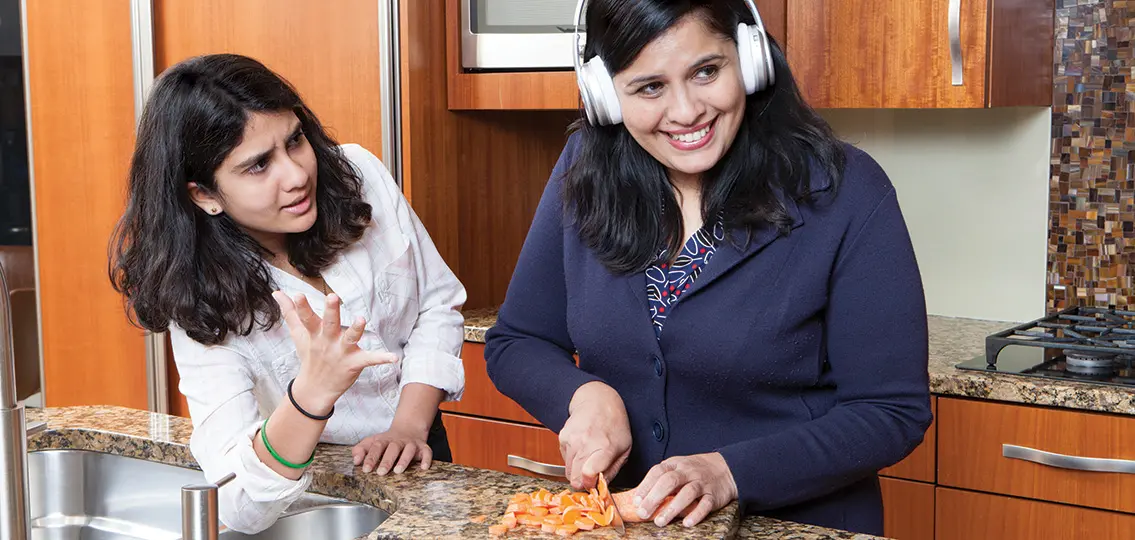My 13-year-old daughter slammed her pencil down on the kitchen counter and put her face in her palms.

“Hey, do you want some help?” I asked.
“Yeah, Mom. Like you could help me with my geometry,” she replied, hastily grabbing her math book while rolling her eyes. “I’m going upstairs.”
“Okay, why don’t you leave your phone down here so you can focus,” I gently said.
“Whatever, I was just going to use the calculator, but if you don’t trust me,” she huffed as she stomped up the stairs.
Truth be told, I was a little hurt at my daughter’s reaction—and this wasn’t the first time. She often made snide remarks about simple requests and was regularly embarrassed by anything I said or did in front of her friends. Her Jekyll-and-Hyde behavior was tiresome.
She was generally a great kid who sometimes said mean things to her mother. Sometimes we could hang out like when she was younger, sharing a hot chocolate or watching a movie, and other times she treated me like I had leprosy. I often wondered what I was doing wrong, and my hurt feelings were getting in the way of our relationship.
Trust Me, It’s Normal Teen Behavior
All of these tense interactions and hurt feelings are completely normal, according to Sheryl Gould, certified parent coach and the founder of Moms of Tweens and Teens. “It’s important that parents of adolescents know they are not alone, and that many feel the same way,” Gould says. “When parents discover that their child’s behavior is normal, they are less likely to take things personally and to understand this is a necessary developmental phase.”
Don’t Take It Personally
Many parents interpret this normal teen behavior as something that is about them, and that can make them feel sad or angry. These parental emotions often increase the tension within the home, which can perpetuate the unwanted teen behavior.
“When the relationship is contentious, I always recommend that parents step far enough back not to get battered by the things their kids say to them. The trick is to find the balance so that you don’t move so far that you lose connection,” says Debi Bailey, a family counselor in Olympia, Washington.
That means sometimes it’s easier to let things go. Try to ignore that snappish remark or eye roll.
“Take your sail out of their wind,” says Bailey. “Walk away. Let them know you will be back when things are calmer. But don’t emphasize their behavior, which will escalate their feelings. No good will come from that.”
Bailey also suggests that it’s crucial for parents to remember that they are the grown-up in these situations.
How to Deal with Teen Attitude:
1. Re-engage
Re-engage with your child as soon as their attitude changes, but don’t hold a grudge. Focus on the behavior you want.
2. Have consequences
Don’t take them places, do things for them, or buy them things when they are acting rude and disrespectful. Explain to them, firmly and kindly, why you are not doing what they want. But if you threaten or are mean when you state your limits and boundaries, they will want to return the same kind of behavior.
3. Find the underlying cause of the behavior
Recognize that underneath any misbehavior is an unmet need—usually for connection and relationship. Consider spending more one-on-one time with your teen.
It’s also vital for parents of teenagers to remember that like all phases kids go through, this normal teen behavior is not permanent.
“Teens are entering into a necessary developmental process of individuating, breaking away as they attempt to develop independence, as they grow into adults,” says Gould. “This means they will care more about what their peers think and will push boundaries to discover who they are apart from their parents.”

“You will be tempted to correct their ignorance, but don’t take the bait. It’s not about winning,” continues Gould. “This is a normal part of figuring out who they are. And, by the way, did you agree with your mom at 16?”




